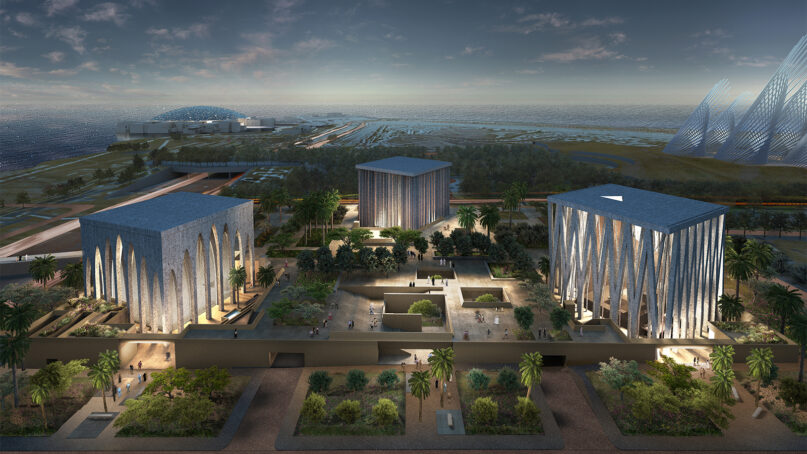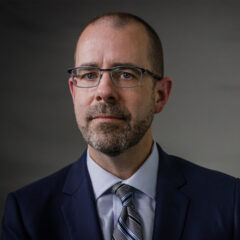THATS WHAT THE TEMPLE MOUNT IS IN JERUSALEM
Abrahamic Family House ‘changes all the rules’ of interfaith understanding
The mosque, church and synagogue complex is a shining monument to tolerance.

(RNS) — On Thursday, Feb. 16, the United Arab Emirates officially opened the Abrahamic Family House, consisting of a mosque, church and synagogue that face one another on the same square in Abu Dhabi. Beside each one stands a tall pillar illuminating an Islamic crescent, Christian cross and a Jewish menorah, respectively, shining a hopeful light for interfaith tolerance and understanding. Something good is happening in the desert — but will it make a lasting difference?
The road to Thursday’s opening began with Pope Francis’ February 2019 trip to the UAE, where he met with the grand imam of al-Azhar, Ahmed el-Tayeb, leader of the oldest Islamic educational institute in the world. Their meeting ended with their signing of the Document on Human Fraternity, which set ambitious goals to foster interfaith understanding.
Four years later, Muslims, Christians and Jews gathered to inaugurate the three worship centers, each representing one of the three Abrahamic faiths, and a representative from each faith provided inaugural remarks.
The president of the center, Mohamed Khalifa Al Mubarak, spoke of a “new landmark” in the country, built within sight of the six-year-old Louvre Abu Dhabi. The three worship sites, he said, stand for hope “for peaceful coexistence and understanding.”
The president of the Pontifical Council for Interreligious Dialogue, Cardinal Miguel Ángel Ayuso Guixot, noting that “fear is the outcome of a lack of knowledge,” referred to the center as a “beacon of mutual understanding.” The cardinal said that believers do not need to walk away from their deeply held beliefs to befriend others and to visit their houses of worship. “Without renouncing different spiritual resources,” he said, “each has a command to live with brothers and sisters whatever their religion.”
Lastly, the chief rabbi of the United Kingdom, Ephraim Mirvis, referred to the moment as “historic,” seeing the “children of Abraham gathered … to build a new world.” He challenged the audience to “recognize the part of the divine in every person” so we can “shape a new world built from loving kindness.”
But what made a remarkable event even more so was how it represented the reestablishment of Jewish life in the UAE, restoring Judaism to its historic place in Middle Eastern life. No purpose-built synagogue has arisen in the region since 1931, but here was the UAE government, which paid for the construction of all three houses, erecting a synagogue in its national capital. Bruce Lustig, rabbi emeritus at Washington D.C.’s Hebrew Congregation, who was involved in the project, told me the new building “changes all the rules.”
But while the center is novel, the UAE has been promoting tolerance for several years. The Abrahamic Family House joins other initiatives, including a special ministry of tolerance, and hosts the Abu Dhabi Forum for Peace. The UAE has also demonstrated a commitment to promoting tolerance outside its borders, supporting UNESCO’s effort to reconstruct a historic mosque and two nearby churches in Iraq’s second-largest city, Mosul, after they were destroyed by ISIS.
Some have questioned the sincerity of these types of efforts, seeing them as a way to distract from the region’s rough politics or deficits when it comes to democracy. But such work can simultaneously reflect a country’s interests and values. The UAE’s leadership has also focused on countering ISIS’ ideology and the Muslim Brotherhood, and the Abrahamic Family House can be seen as a positive flipside to these darker battles.
The Emirates also has a long tradition of tolerance, with Dubai, Abu Dhabi and other port cities historically serving as an opening to the world. Two hundred different nationalities now make their homes and do business in the UAE and generally enjoy freedom of worship. “We remain committed to harnessing the power of mutual respect, understanding and diversity to achieve shared progress,” UAE President Sheikh Mohamed bin Zayed Al Nahyan said on Thursday.
Soon a new Hindu temple will open in Abu Dhabi, further diversifying the religious landscape. But with the proliferation of good things, observers have questioned how far the tolerance initiative will expand. Will the welcoming spirit include converts from Islam, nonbelievers and other communities persecuted in nearby countries, such as Baháʼís and Ahmadis? Do the overlapping initiatives reinforce each other, or duplicate or dilute the overall impact? With all the world’s challenges, can the new complex foster an environment respectful of different beliefs?
UAE Minister of Tolerance Sheikh Nahyan said the center is the Emirates’ attempt to answer these questions.

Knox Thames. Courtesy photo
Such change will not happen overnight. The Abrahamic Family House will be a significant milestone if the center becomes a vibrant place for faiths to interact and fellowship. But a milestone is not an endpoint; rather, it marks progress toward a destination. With its opening, the Abrahamic Family House is now a visible landmark in the Middle East for this journey.
(Knox Thames is the former State Department special advisor for religious minorities in the Middle East and South/Central Asia. Follow him on Twitter @KnoxThames. The views expressed in this commentary do not necessarily reflect those of Religion News Service.)
No comments:
Post a Comment